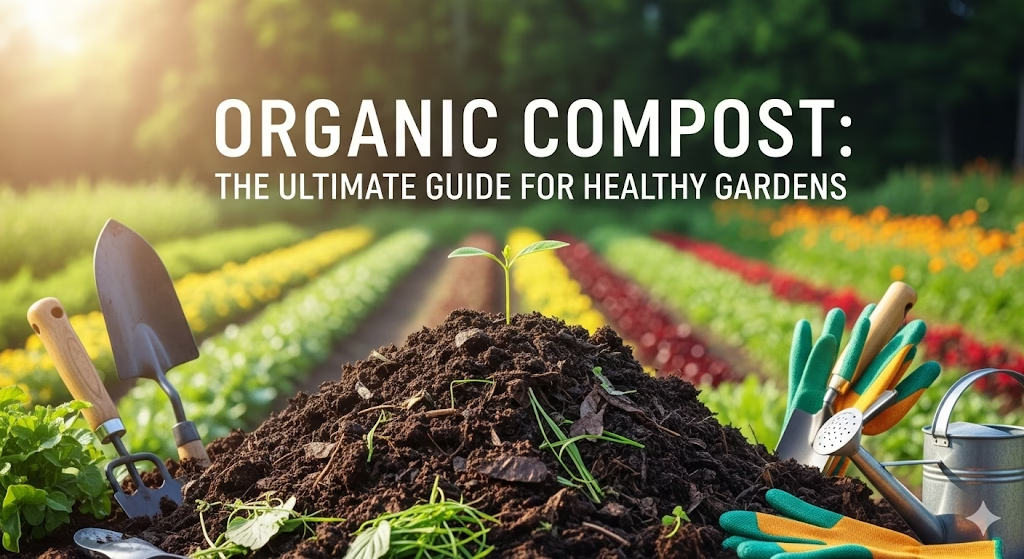Introduction
Healthy soil is the foundation of every thriving garden. Without it, even the most carefully chosen seeds and watering schedules will fail. One of the most effective ways to enrich your soil is with organic compost. Unlike synthetic fertilizers that provide a quick nutrient boost but degrade soil over time, organic compost nourishes both plants and soil organisms.

In this comprehensive guide, we’ll explore what organic compost is, why it matters, how to make it at home, and the different types of compost—such as mushroom compost, chicken droppings compost, and asparagus compost. By the end, you’ll have all the knowledge needed to start producing and using compost effectively.
What is Organic Compost?
Organic compost is decomposed natural material, made from everyday organic matter like fruit peels, vegetable scraps, garden waste, manure, and dry leaves. Microorganisms—such as bacteria and fungi—break down these materials into humus, a nutrient-rich substance that improves soil health.
According to the EPA’s Home Composting Guide, composting not only enhances soil fertility but also reduces waste sent to landfills. By diverting organic matter to compost, gardeners play an active role in sustainability.
Why Use Organic Compost Instead of Chemical Fertilizers?
| Feature | Organic Compost | Synthetic Fertilizer |
|---|---|---|
| Nutrient Release | Slow and steady | Fast, often excessive |
| Soil Health | Improves texture, microbes, and water retention | May disrupt microbial balance |
| Environmental Impact | Eco-friendly, reduces waste | Can cause runoff and pollution |
| Cost | Often free if homemade | Continuous expense |
| Long-Term Benefits | Builds sustainable soil health | May degrade soil over time |
Using organic compost ensures your soil doesn’t just feed plants but continues to improve year after year.
Benefits of Organic Compost
- Nutrient-Rich Fertilizer – Provides nitrogen, phosphorus, potassium, and trace minerals.
- Better Soil Structure – Makes clay soils drain better and sandy soils retain water.
- Boosts Soil Microbes – Encourages fungi, bacteria, and earthworms that support plant growth.
- Moisture Retention – Reduces water usage by keeping soil moist longer.
- Suppresses Plant Diseases – Compost supports beneficial organisms that outcompete harmful pathogens.
- Eco-Friendly Waste Recycling – Converts kitchen and yard waste into something useful.
For more natural soil enrichment methods, see Agzora’s gardening guides.
How to Make Organic Compost at Home
Step 1: Choose a Compost Bin or Pile
- Compost Bin: Ideal for small spaces; keeps compost contained.
- Open Pile: Works for larger gardens; requires more maintenance.
Step 2: Gather Materials
- Greens (Nitrogen): Vegetable peels, fruit scraps, fresh grass, coffee grounds.
- Browns (Carbon): Dry leaves, straw, sawdust, shredded paper.
- Boosters: Manure (like chicken droppings compost) and mushroom compost improve nutrient content.
Step 3: Balance Carbon and Nitrogen
A good rule is 2 parts browns to 1 part greens. This balance prevents bad odors and speeds decomposition.
Step 4: Maintain the Pile
- Moisture: Should feel like a wrung-out sponge.
- Air: Turn pile every 1–2 weeks.
- Temperature: 130–150°F ensures pathogen kill (Cornell Composting Guide).
Step 5: Curing and Using Compost
After 3–6 months, compost becomes dark, crumbly, and earthy-smelling. It’s then safe to apply to soil.
Different Types of Organic Compost
While any compost made from natural materials qualifies as organic compost, specific variations bring unique benefits. Let’s look at three popular types:
1. Mushroom Compost
Mushroom compost is the byproduct of mushroom farming. It contains straw, peat, gypsum, and other organic materials. Once mushrooms are harvested, this leftover material is reused as compost.
- Best For: Vegetables, lawns, and flower beds.
- Benefits: Improves soil texture, adds calcium, retains water.
- Drawback: Slightly alkaline, not suitable for acid-loving plants like blueberries.
2. Chicken Droppings Compost
Chicken manure is extremely nutrient-rich but must be composted before use to prevent burning plants. According to the USDA’s guidelines, composting manure also eliminates pathogens.
- Best For: Leafy greens, corn, tomatoes, and nitrogen-hungry plants.
- Benefits: High in nitrogen, phosphorus, and potassium.
- Drawback: Needs 6–9 months of composting before safe use.
3. Asparagus Compost
Asparagus stalks, fronds, and waste make excellent compost material. They add carbon-rich organic matter, especially when mixed with high-nitrogen materials like chicken droppings.
- Best For: General garden use.
- Benefits: Breaks down well, adds bulk and organic content.
- Drawback: Works best when chopped into smaller pieces.
How to Use Organic Compost in the Garden
- Vegetable Beds: Add 1–2 inches of compost before planting.
- Fruit Trees: Spread around the drip line to enrich soil.
- Lawns: Apply as a top-dressing to improve thickness.
- Container Plants: Mix compost with potting soil (1:3 ratio).
- Mulch Alternative: Spread compost on top of soil to suppress weeds.
Organic Compost Mix: Combining Different Types
Many gardeners find success by blending types of compost:
- Mushroom + Chicken Droppings: Adds structure + high nitrogen.
- Asparagus + Kitchen Scraps: Adds bulk + balanced nutrients.
- All Three Together: Creates a well-rounded compost suitable for most gardens.
Organic Compost Safety Tips
- Always wear gloves when handling manure-based compost.
- Let compost cure fully before applying to edible plants.
- Avoid adding meat, dairy, or oily foods that attract pests.
- Monitor compost temperature to ensure harmful bacteria are destroyed.
For safe handling guidelines, see the CDC’s page on manure safety.
FAQs About Organic Compost
1. Can I make organic compost without a bin?
Yes, an open pile works, but a bin helps control odor, pests, and moisture.
2. How long does compost take to be ready?
3–6 months for regular compost, 6–9 months for chicken droppings compost.
3. Is mushroom compost better than chicken manure compost?
It depends—mushroom compost improves soil texture, while chicken manure is richer in nutrients. Many gardeners combine both.
4. Can asparagus waste go into compost?
Absolutely. Chop it up for quicker breakdown and mix it with nitrogen sources.
5. How often should I apply compost to my garden?
Once or twice a year is usually sufficient—before planting season and midseason for heavy feeders.
Conclusion
Organic compost is more than just fertilizer—it’s a complete soil builder that improves fertility, supports beneficial microbes, and reduces environmental waste. Whether you make compost from kitchen scraps, invest in mushroom compost, recycle chicken droppings, or add asparagus waste, each type contributes to a healthier, more productive garden.
By using compost consistently, you’ll create a sustainable cycle that benefits both your plants and the planet.
Call to Action: For more composting guides and eco-friendly gardening tips, visit Agzora.com and start transforming your garden soil naturally.





